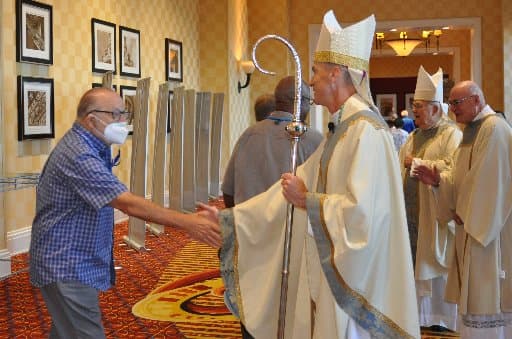BALTIMORE — At the height of the coronavirus pandemic, when face-to-face visits were difficult or impossible, many members of the Society of St. Vincent de Paul relied on phone calls or electronic means to connect critical services and resources with those who needed them the most.
While the switch helped in the continuity of care, it deviated from the society’s historic, deeply ingrained practice of “home visitations” — personally meeting with neighbors in need to listen and learn how the Society of St. Vincent de Paul might find ways of helping.
As the world continues to emerge from the pandemic, Timothy Williams, national formation director of the Society of St. Vincent de Paul’s National Council of the United States, is encouraging his fellow Vincentians to reclaim the home visit and recognize its spiritual power.
Williams spoke Sept. 1 during a national gathering of St. Vincent de Paul members that attracted more than 700 participants Aug. 30-Sept. 3 at the Baltimore Marriott Waterfront Hotel in Maryland.
The primary goal of a member of the society is to grow in holiness through service, Williams said, noting that helping others is helping Christ.
“For that time we are there (at a home visit), we’re in the presence of Christ,” Williams said. “That’s our only focus. That person to us is the most important person in the world.”
Williams recalled that he and other Vincentians have often heard people say during home visits that “you guys were the only ones who called me back.”
“What a powerful thing it is to go out there and to meet Jesus Christ in the flesh,” Williams said. “When we do that, we receive God’s grace.”
During a Sept. 1 workshop, Pamela Matambanadzo and Sandy Figueroa asked participants to view their ministry as part of a “culture of encounter.”
Matambanadzo of Chicago is the chairwoman of the society’s National Multicultural and Diversity Committee, and Figueroa of New York is president of the St. Boniface Conference of the Society of St. Vincent de Paul in Elmont, New York.
In meeting those in need, Matambanadzo said: “You can’t judge. You can’t have preconceived ideas.”
Iola Eden, a member of St. Vincent de Paul in the Archdiocese of St. Louis and a participant in Matambanadzo and Figueroa’s workshop, said group discussions with other Vincentians at the gathering helped reinforce central ideas of the society’s mission.
A fellow Vincentian noted that when his granddaughter meets other children for the first time, she introduces herself and asks to be their friend. That’s what Vincentians are called to do every day in their dealings with the poor and vulnerable, Eden said.
“It’s a childlike openness to take people for who they are,” Eden explained. “It’s saying: ‘Hi, can I be your friend?’ and not ‘Hi, can I be your savior?'”
Founded in Paris in 1833 by Blessed Antoine-Frédéric Ozanam, the Society of St. Vincent de Paul now counts more than 800,000 members in more than 150 countries. There are nearly 90,000 members in more than 4,400 parishes across the United States. The society says it is the world’s largest lay Catholic organization.
The group offers a broad range of services that vary from conference to conference and from diocese to diocese. That includes disaster relief, job training, thrift stores, housing programs, rental assistance, food pantries, educational offerings and medical services.
Ralph Middlecamp, 13th national president of the society’s National Council of the United States, described the organization as a “network of friends.”
“The personal contact we have between members and those we serve is the primary work we have to do as members in order to reach our spiritual growth,” he said. “Improvement of our spiritual life is vital to strengthening our ability to serve.”
Bishop Donald J. Hying of Madison, Wisconsin, the society’s national episcopal advisor, called the Society of St. Vincent de Paul “the greatest organization of the church.”
“I think all of you would agree that it’s become your way of being Catholic and it’s your niche within the church,” he said, “but it’s not something simply tangential or part of your response to God, but in many ways it defines your response to God.”
Renato Lima de Oliveira, president general of the International Confederation of the Society of St. Vincent de Paul, was among those addressing the national assembly and Dan Schutte, a well-known composer of Catholic music, also presented a Sept. 2 spiritual retreat.
Bishop John M. Quinn, retired bishop of the Diocese of Winona-Rochester, Minnesota, was honored with the Society of St. Vincent de Paul National Foundation’s inaugural “Founder’s Award” in recognition of his national service to the society.
– – –
Matysek is managing editor of the Catholic Review, news outlet of the Archdiocese of Baltimore.













